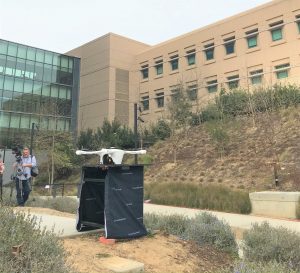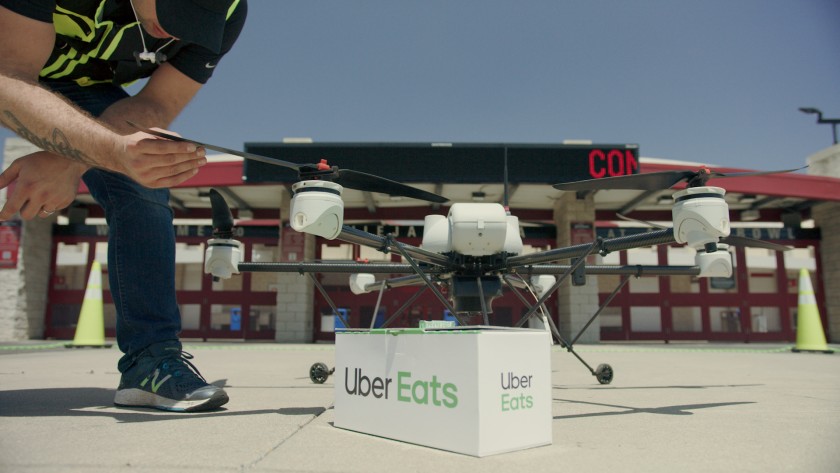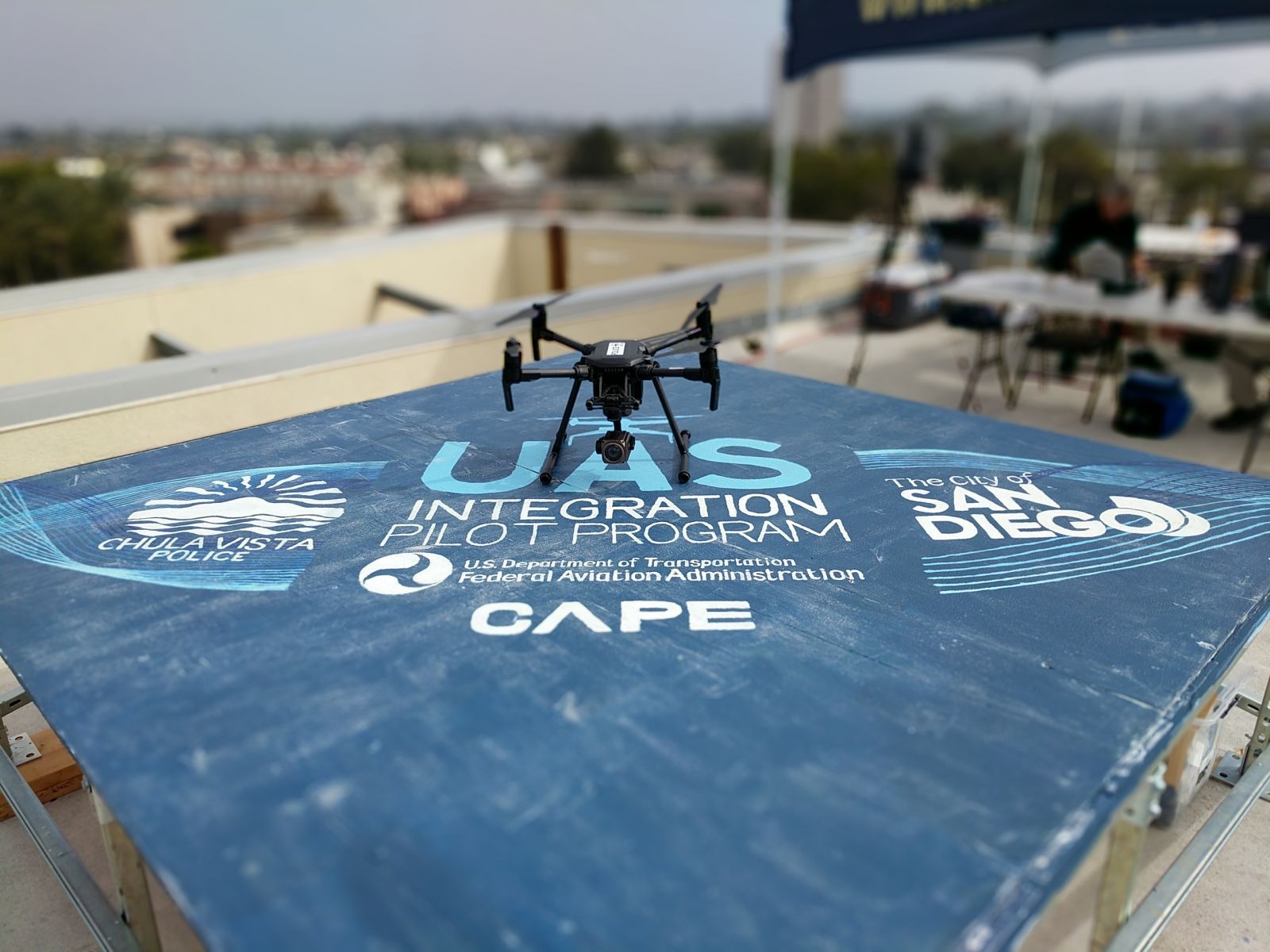In 2017, the United Stated Department of Transportation, which oversees of the Federal Aviation Administration (FAA), launched the unmanned aerial systems (UAS) Integration Pilot Program (IPP) to build pathways that would encourage the expansion of the commercial unmanned aerial systems industry safely and cohesively with existing piloted aircrafts.
Capitalizing on San Diego’s rich aerospace history, industry relationships, and unique operational environment, EDC partnered with the City of San Diego’s Office of Homeland Security to become one of only 10 jurisdictions across the United States to participate.
Over the past three years, San Diego IPP has laid the groundwork for regional companies of all sizes to develop cutting-edge UAS technology here in San Diego by utilizing the streamlined FAA approval process, supporting homegrown talent, and positioning the region as a UAS center of excellence by encouraging the industry’s growth.
As we wrap up the program, below are a few of the key successes:
Public Safety
The challenge:
Chula Vista Police Department is largely understaffed—yet as the second largest city in San Diego County, it has been recognized at the tenth safest city in the United States with jurisdictions of more than 270,000 residents.
The solution:
In coordination with the San Diego IPP, Chula Vista Police Department became the first in the nation to utilize drones as a proactive public safety tool. The department saw drones as a new opportunity to create a Drone as a First Responder (DFR) unit as a safer, less expensive alternative to helicopter and officer units.
San Diego IPP helped Chula Vista Police Department obtain a FAA permissions and waivers to provide safe, transparent jurisdictional coverage. Ultimately, Chula Vista Police Department was able to dispatch UAS to remotely assess the scene of emergency calls for service.
The results:
Together, San Diego IPP and Chula Vista Police Department achieved great heights:
- First public safety organization in the nation to be granted a Beyond Visual Line of Sight Certificate of Authorization.
- First in the nation to achieve a Tactical Beyond Visual Line of Sight (“Close Proximity, Low Altitude”) Waiver. This enables police officers on scene to utilize small UAS to search behind obstacles, at a very low altitude to ensure safety for the officers, suspect, and potential bystanders.
- First in the nation to achieve 2-to-1 Operations and is pending 100 percent jurisdictional coverage for a Public Aircraft Operator Certificate of Authorization. This enables the Remote Pilot in Command (the operator) to operate two drones at one time, an operation that required an entirely new FAA process to be created, and ultimately expanded service coverage for all residents in the City of Chula Vista.
- Safe information dissemination to at-risk populations for COVID-19 response.
- Statewide, nationwide, and international acclaim for public safety and innovation. San Diego IPP and Chula Vista Police Department received the 2020 AUVSI XCELLENCE Humanitarian and Public Safety Award, the 2019 California Police Chief’s Association Innovation Award, and were highlighted in UAS Norway, Chicago Tribune, Police Chief Magazine, Interdrone, Department of Justice’s DRONES publication, and more.
To date, DFR has responded to 4,303 calls, assisted in the arrest of 558 suspects, was the first to arrive on scene 1,987 times, and has an average response time of 224.49 seconds.
Notably, in 1,065 instances, DFR has been able to avoid dispatching officer patrol units on scene—freeing those resources for other service calls and mitigating potential officer-involved confrontations.
COMPLEX AND CRITICAL Delivery
Despite airspace complexities and difficult operating environments, San Diego IPP leapt at the prospect to test the viability of both commercial food and medical specimen delivery within our region. San Diego IPP partnered with Uber, Matternet, and UPS Flight Forward to accomplish cutting-edge, time-sensitive deliveries in San Diego.
Food Delivery
The challenge:
On the heels of a white paper on the future of urban air transportation, Uber Elevate was born. To bring its vision to fruition, Elevate determined a need for a multi-pronged effort at advancing Urban Air Mobility (UAM) efforts nationwide, but needed help obtaining permission for and conducting safe delivery testing.
The solution:
Through a series of tests and strategic public-private partnerships, IPP helped the company take the first step toward urban air transportation.
San Diego IPP matured Uber Elevate’s initial business model past short-distance flights at San Diego State University to focus on a more complex delivery route from coastal Chula Vista to the Coronado Cays. San Diego IPP and Uber Elevate worked with local public and private partners for three months to coordinate efforts for a single week of safe delivery testing and an official Part 107 Commercial Food Delivery in December 2019.
Initially focused on food delivery convenience for the end user, San Diego IPP and Uber Elevate ultimately found an opportunity to expand areas of service for regional small businesses and provide options for communities without equal access to food delivery.
The results:
Through this effort, San Diego IPP achieved:
- The first real time Remote Identification test in the country. Remote Identification allows interested parties to utilize an application that enables the individual(s) watching to identify the drone operator and follow the drones path in real time.
- Strategic public-private partnerships. To achieve one week of operations, San Diego IPP coordinated efforts with Department of Defense (DoD), Department of Homeland Security (DHS), United States Navy – North Island Naval Air Station, and the local field office at Customs and Border Protection to mandate a minimum altitude to avoid conflicts with existing aviators. Additionally, San Diego IPP worked with the Port of San Diego to create new land use agreements for take-off and landing zones in undeveloped areas along the San Diego Bay for the week of operations. Finally, the Cities of Chula Vista and Coronado both engaged in testing planning efforts and advocacy. The first official Part 107 Delivery was made to Coronado City Council Member, Bill Sandke.
- Innovative safety process formation. The United States Fish and Wildlife Service, which oversees two sanctuaries adjacent to the route, worked with the San Diego IPP team to create solutions to addresses the safe operations of UAS in, near, and around animal sanctuaries, in coordination with FAA and the Department of the Interior legal counsels.
Medical Specimen Delivery
The challenge:
With San Diego’s globally recognized expertise and innovation in life sciences, medical specimen delivery was a particularly important goal. With the ability to delivers medical specimens via UAS, San Diego healthcare providers could improve delivery speed and reliability, and ultimately cut costs and improve care. However, Matternet needed help obtaining waivers for night operations and flights over people to support its tests.
The solution:
After extensive groundwork, San Diego IPP helped Matternet obtain accommodations for proof-of-concept flights at UC San Diego Health’s Jacobs Medical Center, including a §107.39 waiver enabling operations over people and a §107.29 waiver enabling operations at night. Matternet and UPS Flight Forward were operable and making vertical moves in San Diego by early 2020.
The results:
San Diego IPP, with Matternet and UPS Flight Forward, accomplished:
- 259 successful flight operations at the UC San Diego Health Jacobs Medical Center.
- Two separate route approvals on the UCSD Health Jacobs Medical Center Campus.
Next Steps
After three years of aiding in the development and growth of an emerging innovation industry, San Diego IPP will not be moving forward with the FAA’s next step, BEYOND.
EDC will continue to work to ensure San Diego remains a welcome space to research, design, develop, test, and advocate for the drone community, and will continue to provide exemplary service for any UAS business interested in expanding their business or concepts in our region.
Finally, we are excited to continue working with our regional leaders to ensure that we support opportunities that advance this emerging industry, as innovation is the cornerstone to our region.
Contact SDREDC
You might also like:


 From surveying land after natural disasters to delivering packages, drones offer a world of possibilities to advance society and unlock economic potential. However, in order for this type of drone work to become a reality, they must be able to operate beyond a visual line of site(BVLOS). At the moment, no one is allowed to fly BVLOS in U.S. airspace without obtaining a special, hard-to-get waiver from the Federal Aviation Administration (FAA).
From surveying land after natural disasters to delivering packages, drones offer a world of possibilities to advance society and unlock economic potential. However, in order for this type of drone work to become a reality, they must be able to operate beyond a visual line of site(BVLOS). At the moment, no one is allowed to fly BVLOS in U.S. airspace without obtaining a special, hard-to-get waiver from the Federal Aviation Administration (FAA).